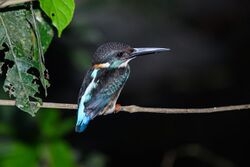Biology:Blue-banded kingfisher
| Blue-banded kingfisher | |
|---|---|

| |
| A male blue-banded kingfisher | |
| Scientific classification | |
| Domain: | Eukaryota |
| Kingdom: | Animalia |
| Phylum: | Chordata |
| Class: | Aves |
| Order: | Coraciiformes |
| Family: | Alcedinidae |
| Subfamily: | Alcedininae |
| Genus: | Alcedo |
| Species: | A. euryzona
|
| Binomial name | |
| Alcedo euryzona Temminck, 1830
| |
The blue-banded kingfisher (Alcedo euryzona), is a species of kingfisher in the subfamily Alcedininae. Its natural habitats are subtropical or tropical moist lowland forest, subtropical or tropical mangrove forest, and rivers. It's a small, rather dark kingfisher. Male is highly distinctive, with a broad blue-green band across a white chest. Female is very different, with an all-orange belly; distinguished from Common Kingfisher by overall duller, darker coloration and the lack of a bright white-and-orange patch behind the eye, its call is piercing similar to the common kingfisher
Taxonomy
The first formal description of the blue-banded kingfisher was by the Dutch zoologist Coenraad Jacob Temminck in 1830. In his initial publication the binomial name was incorrectly printed as Alcedo cryzona but this was later corrected to Alcedo euryzona.[2][3] The specific epithet euryzona is from the classical Greek eurus meaning "broad" and zōnē meaning "band" or "belt".[4]
Two subspecies are recognised:[5]
- A. e. peninsulae Laubmann, 1941 – south Myanmar, Malay Peninsula, Sumatra, southwestern Thailand and Borneo
- A. e. euryzona Temminck, 1830 – Java
In a world list of non-passerine species published in 2014, del Hoyo and colleagues promoted A. e. peninsulae to species status with the vernacular name "Malay blue-banded kingfisher".[6][7]
References
- ↑ BirdLife International (2018). "Alcedo euryzona". IUCN Red List of Threatened Species 2018: e.T22726971A125574893. doi:10.2305/IUCN.UK.2018-2.RLTS.T22726971A125574893.en. https://www.iucnredlist.org/species/22726971/125574893. Retrieved 12 November 2021.
- ↑ Temminck, Coenraad Jacob (1838). "Martin-pêcheur large bande - Alcedo cryzona" (in fr). Nouveau recueil de planches coloriées d'oiseaux, pour servir de suite et de complément aux planches enluminées de Buffon. 4. Paris: F.G. Levrault. Plate 508. https://www.biodiversitylibrary.org/page/35465344. The 5 volumes were originally issued in 102 parts, 1820-1839
- ↑ Peters, James Lee, ed (1945). Check-list of Birds of the World. 5. Cambridge, Massachusetts: Harvard University Press. p. 175. https://www.biodiversitylibrary.org/page/14480186.
- ↑ Jobling, James A. (2010). The Helm Dictionary of Scientific Bird Names. London: Christopher Helm. p. 154. ISBN 978-1-4081-2501-4. https://archive.org/details/Helm_Dictionary_of_Scientific_Bird_Names_by_James_A._Jobling.
- ↑ Gill, Frank; Donsker, David, eds (2017). "Rollers, ground rollers & kingfishers". World Bird List Version 7.2. International Ornithologists' Union. http://www.worldbirdnames.org/bow/rollers/.
- ↑ del Hoyo, J.; Collar, N.J.; Christie, D.A.; Elliott, A.; Fishpool, L.D.C. (2014). HBW and BirdLife International Illustrated Checklist of the Birds of the World, Volume 1: Non-passerines. Barcelona: Lynx Edicions. ISBN 978-84-96553-94-1.
- ↑ del Hoyo, J.; Collar, N.; Kirwan, G.M.; Sharpe, C.J. (2017). "Malay Blue-banded Kingfisher (Alcedo peninsulae)". in del Hoyo, J.; Elliott, A.; Sargatal, J. et al.. Handbook of the Birds of the World Alive. Lynx Edicions. http://www.hbw.com/node/467398.
External links
Wikidata ☰ Q510682 entry


